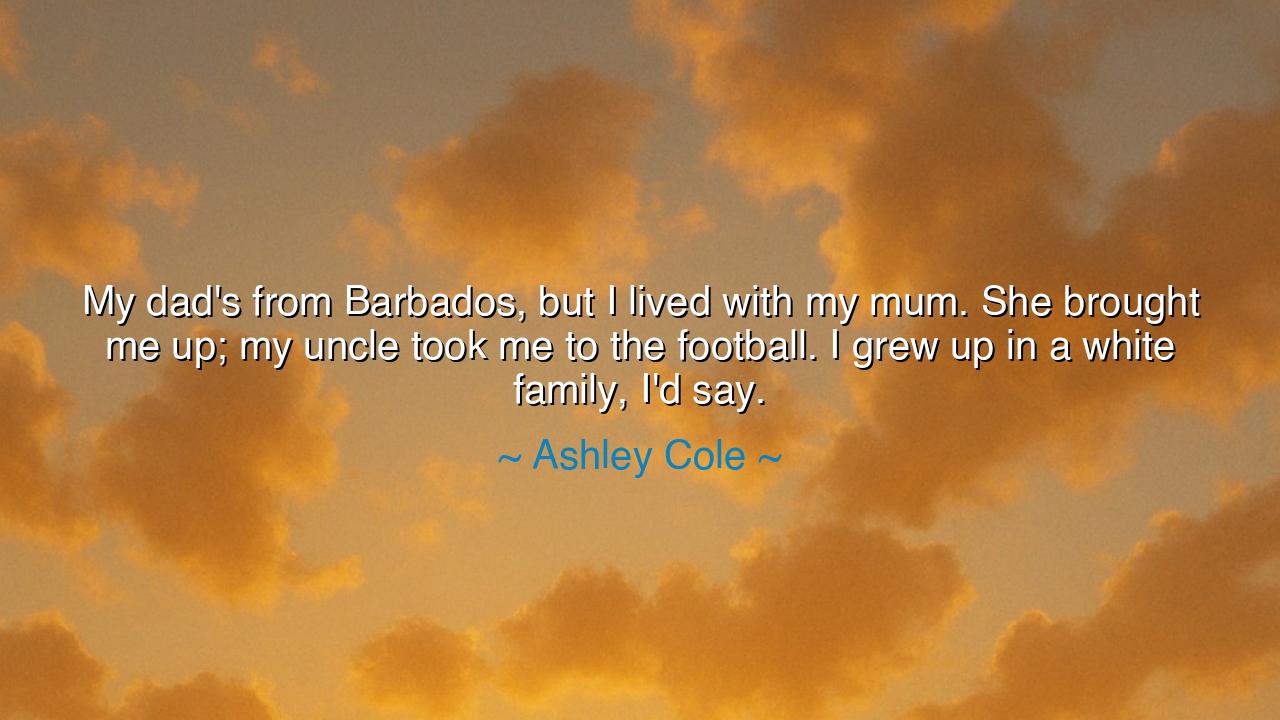
My dad's from Barbados, but I lived with my mum. She brought me
My dad's from Barbados, but I lived with my mum. She brought me up; my uncle took me to the football. I grew up in a white family, I'd say.






Host: The room is quiet, the soft glow of the lamp casting a peaceful light across the space. Outside, the world has quieted, and the stillness of the evening has settled in. Jeeny sits on the couch, her fingers lightly tapping the edge of her cup, her eyes focused but distant. Jack, standing near the window, watches the darkened street, his mind clearly reflecting on something deeper. The air between them feels like something is about to be uncovered, a thought waiting to be explored.
Jeeny: “Jack, I came across something today that made me think,” she says softly, her voice drawing his attention. “It’s a quote from Ashley Cole. He said, ‘My dad’s from Barbados, but I lived with my mum. She brought me up; my uncle took me to the football. I grew up in a white family, I’d say.’ What do you think about that?”
Jack: He turns slowly, his expression contemplative. “That’s an interesting statement. Ashley Cole acknowledging his background in such a direct way. I guess it’s a reflection of how identity can be shaped by different influences. Growing up in a white family, but with roots that are connected to Barbados, that must have created a unique sense of who he is. Do you think he feels torn between those two parts of his identity?”
Jeeny: “I think what’s striking is how he identifies with his upbringing. Ashley Cole clearly has a connection to both his heritage and the environment he grew up in, but he also seems to define himself by the experiences that shaped him the most — football, his mum, and his uncle. It’s not about choosing one part of his identity over the other, but acknowledging that both the cultural and familial aspects of his life have played a role in shaping him.”
Host: The quiet in the room deepens, the conversation moving from the surface of the quote to the deeper layers of identity and influence. Jeeny speaks with the understanding that identity is not defined by a singular aspect of one’s life, but by the intersections of various cultural, familial, and personal experiences. Jack stands still for a moment, taking in what she said, as if reflecting on how complex identity can be when it’s shaped by multiple worlds.
Jack: “So, you’re saying that his identity isn’t about choosing between his Barbadian roots and growing up in a white family, but it’s more about how those influences blend together? Maybe his sense of self isn’t just about one or the other, but about how he’s shaped by both?”
Jeeny: “Exactly. It’s about embracing the complexities of his upbringing. Ashley Cole isn’t confined to a single label or category. He’s shaped by multiple parts of his life — his family, his culture, and the experiences he’s had. The way he talks about it suggests he recognizes that those different influences are interwoven in who he is, rather than something separate.”
Host: The room feels quieter now, the concept of identity becoming more layered between them. Jeeny and Jack both reflect on how identity is not a simple, singular thing. It’s a collection of experiences, influences, and choices, and understanding that complexity can offer a richer, more nuanced perspective of self.
Jack: “I guess identity is never just about where you come from, or even how you’re raised. It’s about everything — the places you’ve been, the people you’ve known, and the things that shaped you along the way. Even if he grew up in a white family, the experiences of his roots and his culture are always part of him.”
Jeeny: “Exactly. It’s about wholeness — understanding all the parts of yourself and how they’ve shaped you, without needing to pick just one. Ashley Cole doesn’t need to choose between these identities. He is the sum of all these influences, and that’s what makes his experience unique.”
Host: The soft hum of the world outside continues, but inside, the conversation feels deeper now. Jeeny and Jack sit together, reflecting on the complexity of identity, how it’s shaped not just by where we come from, but by everything we experience. The idea that we are the sum of all our influences, rather than defined by any one thing, settles into the space between them, a shared understanding that identity is a richer, more intricate thing than simple labels allow.






AAdministratorAdministrator
Welcome, honored guests. Please leave a comment, we will respond soon